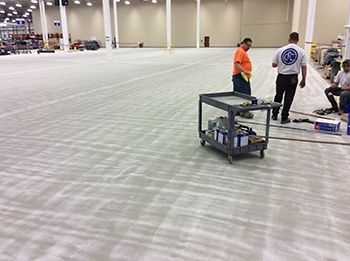 Industrial site owners or managers interested in improving their flooring’s performance while reducing risks associated with their industry would consider an industrial floor coating a sound investment. They can ensure that they get the maximum benefits possible according to their industry by consulting the floor coating recommendations below.
Industrial site owners or managers interested in improving their flooring’s performance while reducing risks associated with their industry would consider an industrial floor coating a sound investment. They can ensure that they get the maximum benefits possible according to their industry by consulting the floor coating recommendations below.
Agricultural Processing, Food & Beverage Manufacturing
If you are a facility that is evaluated by the USDA, then chances are you are required by law to implement a flooring system that can resist microbial growth while minimizing dust and controlling residue.
Both polyurethane and epoxy will satisfy USDA floor coating requirements. Epoxy may be more useful for areas that see heavier machine or foot traffic, while polyurethane can be marginally easier to maintain and clean. Polyurethane is also more resistant to scratching. Both materials are non-reactive to a wide variety of chemicals, both acidic and alkaline. All of these properties make either material an excellent choice for food, beverage or meat manufacturing.
High Slip Industries — Meat Processing, Machinery Shops, Chemical Facilities, Etc.
Industries that see repeated spills or a high likelihood of liquids, oils or grease on the floor should look to slip resistant floor coating systems that use a coating substance mixed with a coarse aggregate like sand or crushed minerals. These aggregates are mixed in with the top layers of the coating, meaning that they hold fast and are spread with enough depth to withstand a certain amount of wear.
Both epoxies and polyurethanes will work for this function, but polyurethanes are slightly easier to use with suspended aggregates.
Electronics Workshops, Electronics Manufacturing
Any facilities that regularly work with electronics or small circuits must take precautions to ensure that electrostatic discharges do not transfer from workers or equipment into equipment. Otherwise, even the tiniest spark could render valuable components completely useless.
Electrostatic dissipative flooring (ESD) is used by industries that face these risks. Together with a grounding system that includes specialized shoes, work mats and other apparatus, ESD flooring can be an integral part of quality control that saves your facility hundreds of thousands every year.
Chemical Manufacturers, Industrial Processing
Industrial facilities that use extremely acidic, alkaline or generally corrosive materials will require a special blend of high-strength, chemical-resistant epoxy. These chemical resistant floor coatings may not only prolong the lifespan of factory flooring systems, but they can prevent dangerous reactions that occur when certain chemicals make contact with flooring and produce fumes. Cleanup is also simplified since chemicals are prevented from penetrating the surface’s pores.
Want to Know the Best Floor Coating for Your Industry? We Can Help!
CPC Floor Coatings has years of experience assessing the needs of a project or individual site and responding with the perfect industrial floor coating for that environment. If you are worried about safety, regulatory compliance or risk of financial loss, we can recommend the best-performing floor coating system for your unique needs.
Get started by researching the specialty industrial floor coatings we offer and then contacting us with information about your site and project demands.

